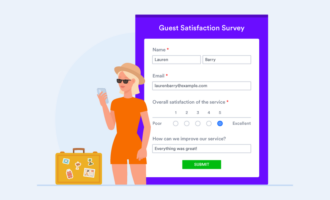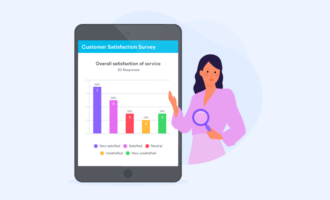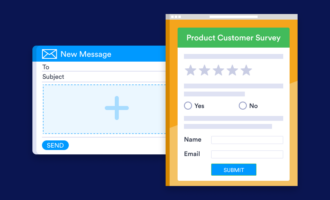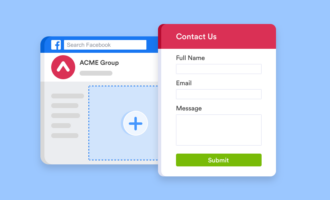General real estate survey questions
- How did you find us?
- What made you choose us as your real estate service provider?
- Are you currently working with another agent?
- How do you prefer to be contacted?
- Have you been doing any research of your own on home buying/selling?
- Have you ever purchased/sold property before?
- Do you have any feedback about our services?
Real estate isn’t an easy business to be in. Housing prices and interest rates seem to fluctuate constantly, and both can be notoriously difficult to predict. Even with this volatility, though, many people flock to the profession. In fact, there were more than 1.53 million realtors working in the United States as of February 2023.
The most successful agents find ways to stand out. One such tactic is surveying buyers and sellers to better understand their needs. Conducting real estate surveys can give you a leg up on your competitors and help you serve clients more effectively.
Want to get started with a real estate survey? Keep reading to find out how surveying can be helpful, get tips for creating an effective survey, and see some examples of real estate survey questions for both buyers and sellers. Plus, we’ll show you an easy-to-use survey software that will get you up and running quickly.
See how a proptech startup effectively uses online forms to gather crucial data and insights. Learn from their experience to enhance your own survey strategies with real estate forms.
Reasons to conduct real estate surveys
Why should you go through the trouble of creating, distributing, and managing real estate surveys for your buyers and sellers? There’s one key reason: Surveys give you the information you need to address clients’ needs from the start.
Sometimes clients haven’t fully thought through what they really want when they visit a real estate agent. A real estate survey encourages them to consider their wants and needs more carefully. In turn, this gives you better insight into their real estate goals and what they’re looking to get out of working with an agent.
Having a clear picture of your buyers’ and sellers’ needs helps you navigate clients through the process — and achieve their goals — more quickly. For buyers, you can be more deliberate about choosing properties to show; for sellers, you can develop a more targeted sales strategy.
Additionally, when you’ve collected a large amount of survey data from many clients, you can use that data to spot trends and predict behaviors. This allows you to position your agency to capitalize on those trends, and it helps you better meet client needs from the get-go.
Tips to create an effective real estate survey
To design a real estate survey that will actually succeed in gathering the data you need, consider these words of advice.
- Narrow down your audience. Rather than using the same survey for buyers and sellers, customize it for each audience segment so you can ensure the questions are relevant to their needs. Otherwise, you may end up with surveys that don’t provide you with the insight you’re looking for.
- Get the timing right. In most cases, the best time to give your buyers or sellers a real estate survey will be at the beginning of the process, often before an initial meeting. Asking the questions up front ensures you can adequately prepare for your meeting using the information they’ve provided. Otherwise, you could end up wasting both your time and theirs if it turns out their goals aren’t aligned with what you offer.
- Focus on relevant questions. Survey respondents may get frustrated if the survey contains many questions that aren’t relevant to their situation. Use branching or conditional logic so they only see questions based on their answers to previous questions.
- Include a mix of multiple choice and open-ended questions. Open-ended questions will help you gather valuable information about people’s experiences and feelings, while multiple-choice questions produce structured data that’s easy to interpret. Both types of information are useful in helping you reach your goals.
- Allot time for reviewing responses. If your buyers or sellers have taken the time to fill out the survey, you need to take the time to carefully read through their answers and let the insights you’ve gained inform your future interactions.
Real estate survey questions for buyers
What types of real estate survey questions should you ask home buyers? Check out these examples:
- Why do you want to buy a home?
Are the clients looking to upgrade or downsize? Do they want to invest in a rental property? This information is key to determining their goals.
- How do you plan to finance the purchase of the home?
You’ll need to know whether they’re working with a lender or mortgage agent, for example, or whether they’ll use the equity from the sale of their existing home to finance this purchase.
- What is your budget for this purchase?
Be sure to ask about the total cost of the home as well as how much they can afford in monthly payments, including interest.
- What are your must-have criteria?
For example, how many bedrooms do they need, or do they prefer a home in a specific location?
- What are your nice-to-have criteria?
For example, would it be nice to have a big backyard or be within walking distance to the nearest school?
- Are there any deal-breakers I should be aware of?
This may include aspects such as specific features of a house, whether or not the house is part of a homeowners association, where it’s located, what the client’s price limit is, or other criteria.
- What is your timeline for buying a home?
This is a good way to gauge the client’s level of commitment. Are they ready to buy today, or are they just dipping their toe into the market?
- Have you worked with a real estate agent before?
This question will help you determine the buyer’s interest and experience in the real estate market.
Real estate survey questions for sellers
Ask your sellers these real estate survey questions to gather important insights:
- Why are you looking to sell your home?
Knowing the reason for the sale is important so you can better understand a client’s goals.
- What is the ideal selling price you are hoping to get?
This question helps you figure out whether a client’s expectations align with the market value of the home.
- Where will you live once the home is sold?
This question helps you determine whether this seller client can also become a buyer client.
- What is your timeline for selling the home?
This question helps you prioritize your work and determine a client’s level of interest.
- Is there anything we should know about the home or the neighborhood that may help or hinder the sale?
For example, has there been any substantive damage to the home or landscape or are there any special benefits to living on this street? Sometimes you can use this information to write a more captivating listing.
- What was your favorite part of this home?
This information may be a key selling feature for potential buyers.
- Have you tried to sell this home before?
This is an important question to ask because it may provide insight into issues with the home or with the clients.
- Do you understand what is involved in staging a home when getting it ready for a sale?
Depending on the home and the area, there can be quite a lot of work involved in staging a home, including professional cleaning and redecorating.
General real estate survey questions
Surveys are a great way to learn more about your clients, but not all questions need to be specific to buying and selling. Consider gathering other types of information that could also be helpful in promoting a smooth working relationship, or even making improvements to your business. Here are some options.
- How did you find us? This question helps assess the success of your marketing tactics. If many people were referred by previous clients, for example, continue to focus on creating excellent customer experiences so you can keep those referrals coming. If many people found you via your website, then you’ll want to continue to maintain and even upgrade your site.
- What made you choose us as your real estate service provider? This question does double duty: First, it can help identify what makes you stand out from your competition, which is useful information for marketing purposes. Additionally, it also highlights what’s important to your client — data that you can use to make the experience even better for them.
- Are you currently working with another agent? You can avoid stepping on anyone else’s toes by getting clarification on this right from the start.
- How do you prefer to be contacted? Give people lots of options for communication — phone, email, text message, etc. — and find out about the best times to contact them, too. Smooth communication is essential in this relationship.
- Have you been doing any research of your own on home buying/selling? Knowing what tools prospective clients have been using on their own helps you get on the same page with them quickly. Their answers can serve as a great jumping-off point for conversations about what they expect from you and their desired outcomes.
- Have you ever purchased/sold property before? If so, what did you like or dislike about the process? Hearing from clients who have strong opinions in this area will give you a leg up in serving them better.
- Do you have any feedback about our services? This is a hard question to ask because the answers may not always be positive. But remember — you can often get the best information from relationships that didn’t work out! Criticism is essential for growing and improving your own skills and the skills of your team.
Create a real estate survey preloaded with these 7 questions.
Questions to avoid asking in a real estate survey
Experienced agents are well aware that not all topics are on the table when it comes to real estate surveys. Here’s what to avoid in your next questionnaire:
- Avoid asking about race, gender, religion, or sexual orientation. By law, agents are required to treat all clients the same, regardless of these factors; asking this question could put you in hot water.
- Avoid asking finance and income-related questions. Many people would be hesitant to answer these types of questions in a survey, simply because they can’t be sure where their responses will end up. But that doesn’t mean you can’t ask about finances at all — simply wait until you’re talking face-to-face. People will feel more comfortable giving a response as part of a casual, in-person meeting than they would in a survey.
- Avoid asking about marital status or children. While this information could be useful in matching homes to people, questions like these could put you at risk of violating fair housing laws. However, you could ask if they have a preference in terms of school districts, which will likely (indirectly) provide the answer you need.
- Avoid asking questions that aren’t relevant to your goal. Irrelevant questions frustrate survey participants and won’t give you the answers you need. If you’re trying to learn more about how you can better serve sellers, for example, don’t include survey questions that are more appropriate for buyers.
Jotform: For real estate surveys and more
Jotform is an online survey maker that many real estate agents use in their business. One of the best features of this software is that it comes with hundreds of ready-made templates you can use as-is or customize using the intuitive drag-and-drop builder.
Jotform includes a variety of templates for real estate surveys, such as a real estate buyer questionnaire and a real estate offer form. Not only that, but Jotform also has templates for other relevant business processes, such as gathering client information, onboarding clients, and getting feedback after the deal is done.
These types of forms gather a lot of personal and confidential information, but both real estate agents and their clients can rest assured that their data is safe, as Jotform prioritizes security through encryption, a 256-bit SSL connection, and other methods. Plus, it’s easy to send forms directly to clients through Jotform using email, QR codes, or links. Get started crafting your real estate survey questions today!
Photo by Francesca Tosolini on Unsplash






































































































Send Comment: